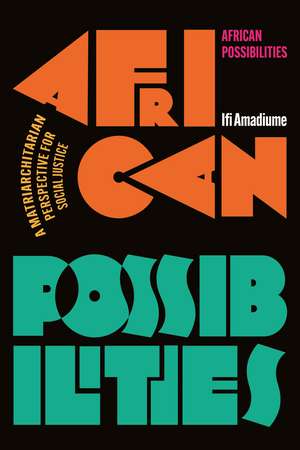African Possibilities: A Matriarchitarian Perspective for Social Justice
Autor Ifi Amadiumeen Limba Engleză Hardback – 21 feb 2024
Preț: 98.49 lei
Preț vechi: 147.21 lei
-33% Nou
Puncte Express: 148
Preț estimativ în valută:
18.85€ • 20.35$ • 15.81£
18.85€ • 20.35$ • 15.81£
Carte disponibilă
Livrare economică 29 martie-12 aprilie
Livrare express 15-21 martie pentru 80.26 lei
Preluare comenzi: 021 569.72.76
Specificații
ISBN-13: 9781350333802
ISBN-10: 1350333808
Pagini: 248
Dimensiuni: 156 x 234 x 25 mm
Greutate: 0.52 kg
Editura: Bloomsbury Publishing
Colecția Zed Books
Locul publicării:London, United Kingdom
ISBN-10: 1350333808
Pagini: 248
Dimensiuni: 156 x 234 x 25 mm
Greutate: 0.52 kg
Editura: Bloomsbury Publishing
Colecția Zed Books
Locul publicării:London, United Kingdom
Caracteristici
Follow-up to the acclaimed, seminal work Male Daughters, Female Husbands: Gender and Sex in an African Society (1987), which critiqued Western gender essentialism three years before Judith Butler's Gender Trouble
Notă biografică
Ifi Amadiume is a tenured full Professor at Dartmouth College, USA, where she has taught both in the Department of Religion and the African and African American Studies Program. She has taught courses cross-listed in many departments and programs such as Women and Gender Studies Program, and the Anthropology Department. She is also a writer and an award-winning poet of many books. Amadiume is the author of several books and articles, including the influential Male Daughters, Female Husbands (Zed Books, 1988, new edition 2015) that won the Choice Outstanding Academic Book of the Year award in 1989 and one of Africa's Best 100 Books of the 20th century award.
Cuprins
AcknowledgementsDedicationPREFACEINTRODUCTIONPART 1 VOICINGChapter One, Prophecy, Authenticity, Oppositional Models of Resistance inAfricaChapter Two, African Perspectives on Religious Conscience and the GlobalEconomyChapter Three, Culture and Religious Traditions of Gender and Development inAfrica: Gendering Civil Society and the StateChapter Four, The Endogenous Project And A Struggle for Culture and VoicePART 11 ALTERNATIVESChapter Five, Citizenship, Rights and Freedoms in Contesting ReligiousNarratives of Gods and GoddessesChapter Six, Mama Asta: an African Muslim matriarchy in SenegalChapter Seven, Bodies, Choices, Globalizing NeoColonial Enchantments: AfricanMatriarchs and Mammy WaterPART III POSSIBILITIESChapter Eight, Gender, Culture and the Family in AfricaChapter Nine, Matriarchy and the Postcolonial: Possibilities and DisenchantmentsChapter Ten, Sexuality, African Religio-Cultural Traditions and Modernity:Expanding the LensChapter Eleven, Writing for Justice, Seeking Inclusiveness, Implicating the WorldChapter Twelve, Postscript or Afterword: Progressing with Matriarchitization
Recenzii
Contrary to feminist theories that presuppose an almighty patriarchy that is hegemonic globally, Ifi Amadiume has been theorizing, over and over again, the reality that white supremacist imperialist patriarchy never succeeded in wiping out indigenous knowledge systems and women's agency in toto. Rather, wherever there is patriachiality, careful research methodologies are bound to reveal oppositional matriachiality and vice versa. Drawing from her background in the cultural studies of religion, the inspirational poet-activist intellectual reminds us in African Possibilities that the world would be a more humane place when the marginalization of the immense contributions from poor women and Africans is ended to make way for the democratization and decolonization of economic, political, educational, technological, family, and spiritual institutional leadership in the interest of all.
In this triumphant return, Professor Ifi Amadiume, the foremost scholar of matriarchy in West Africa, further develops the concept of matriarchitarianism, introduced in her influential work, Male Daughters, Female Husbands: Gender and Sex in an African Society (1987). Rooted in the works of contemporary colleagues in and of the African continent, students of empire and liberation will find African Possibilities to be foundational to the establishment and growth of inclusive epistemologies by African scholars, that imagines a just future for Africa and the world.
In this triumphant return, Professor Ifi Amadiume, the foremost scholar of matriarchy in West Africa, further develops the concept of matriarchitarianism, introduced in her influential work, Male Daughters, Female Husbands: Gender and Sex in an African Society (1987). Rooted in the works of contemporary colleagues in and of the African continent, students of empire and liberation will find African Possibilities to be foundational to the establishment and growth of inclusive epistemologies by African scholars, that imagines a just future for Africa and the world.
